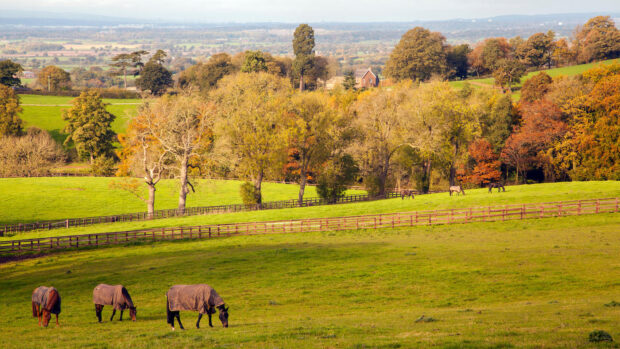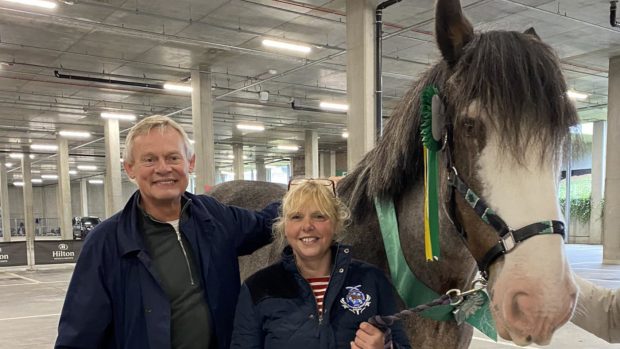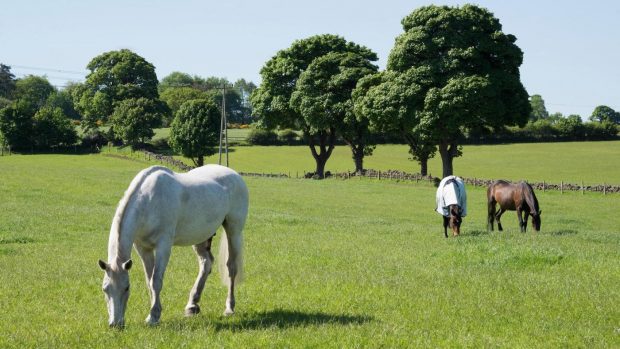Vets, researchers, and fundraisers have gathered to make progress in “solving the equine grass sickness puzzle”, agreeing that collaboration and awareness is the way forward.
These were some of the key themes at the Equine Grass Sickness Fund (EGSF) conference last month (29 March), where a number of researchers gave presentations, and panel discussions tackled raising awareness of EGS and fundraising.
Chris Proudman of the Surrey Vet School presented on the “power of partnerships” and that working with different specialists could help tackle the disease. He said pathologists, immunologists and microbiologists can all play a role, as well as sociologists and psychologists, who could help understand how human behaviour might have an impact on the incidence of grass sickness.
“There are plenty of people from other disciplines that could potentially help us in understanding the disease and effective preventative strategies,” he said.
During a panel discussion, vets tackled some of the challenges faced in dealing with EGS and the need for more awareness of the disease.
John Keen, of the Royal (Dick) School of Veterinary Studies, said it is very hard to tell the difference between an acute grass sickness case and an acute presentation of colic.
“We take a lot of care trying to delineate the different factors that are going to help us with our diagnosis, it’s like a big jigsaw puzzle,” he said, adding that vets consider the risk factors such as the animal’s age and whether it is coming from an area or premises with previous grass sickness cases.
“But undoubtedly we do get cases where it’s hard to tell the difference between the two, because a lot of the clinical signs are very similar – a high heart rate, distended small intestines, nasogastric reflux. If we didn’t have a really good clue whether it was grass sickness or acute colic, we would tend to send the horse for surgery to try to make that diagnosis,” he said.
“Undoubtedly, if we can develop better ways of trying to help us with that diagnosis of acute grass sickness or acute colic, then all the better, whether that be in the clinical sense or when we take a horse to surgery.”
It was acknowledged that the national biobank set up by the EGSF in 2021 plays an important role in helping researchers understand the disease. Biobank samples can include blood, urine, faeces and saliva samples from horses who have been diagnosed with EGS – and tissue samples from horses who have not survived.
The panel agreed that awareness of EGS and the biobank remains limited in areas, particularly outside Scotland. IVC Evidensia equine group veterinary advisor Graham Hunter said he believes that engaging directly with vets is the way to tackle this.
“We need a better way of disseminating the information further than just the northeast of Scotland,” he said.
The challenges around asking owners to provide tissue samples following the death of horses were also discussed.
“In Aberdeenshire, most owners are very aware of grass sickness and the biobank – if they don’t know about it, then a friend does. We haven’t had a case where we haven’t done a post-mortem and sent samples [to the biobank],” said David Miskelly of Woodside Vets, who added that they encourage clients to provide samples “for the greater good of the horse population”.
Mary Jo Grant, of Conanvet in Dingwall, said that although she finds clients will recognise grass sickness, a challenge is then getting them to accept vets taking samples.
“I think that’s where we now have to engage our time. At the time, it’s a very emotional situation that you are dealing with,” she said, adding that it might be beneficial to have conversations about things like providing post-mortem samples with owners of healthy horses.
“It’s a bit like humans with organ donation; the conversation should be had so if at a point this does happen, what are your wishes?”
Dr Hunter added that he believes owners are engaged about equine grass sickness, but the issues include educating them on the biobank and post-mortems. It was suggested that it could be worth referring to the procedure of taking biobank samples as “tissue retrieval” instead of a post-mortem, which could be received by some owners as “too clinical”.
Beth Wells, of the Moredun Research Institute, said the “forward plan is working together”.
“We’re very keen to be as inclusive as we can within research and outside,” said Dr Wells.
“We are in the middle of a recruitment process for a new researcher and they will be concentrating on pilot projects. That pilot data will then be used to submit funding applications with collaborators, so what we really need is to run the pilots, get the preliminary results then we have something to work with.”
You might also be interested in:

Call for owners to play ‘crucial’ role in equine grass sickness research
A new equine grass sickness ‘biobank’ has been formed, containing samples from horses and soil samples, that will play a

Disappointing news in quest for equine grass sickness vaccine
The field trial for an equine grass sickness vaccine has proved inconclusive, but has also thrown up new information about

Grass sickness – a veterinary emergency needing immediate action
Horse & Hound magazine, out every Thursday, is packed with all the latest news and reports, as well as interviews, specials, nostalgia, vet and training advice. Find how you can enjoy the magazine delivered to your door every week, plus options to upgrade your subscription to access our online service that brings you breaking news and reports as well as other benefits.





